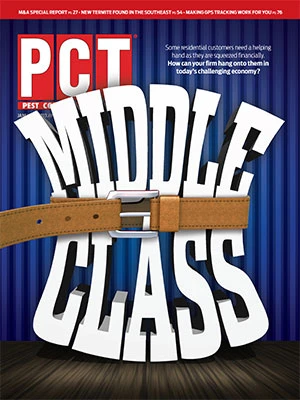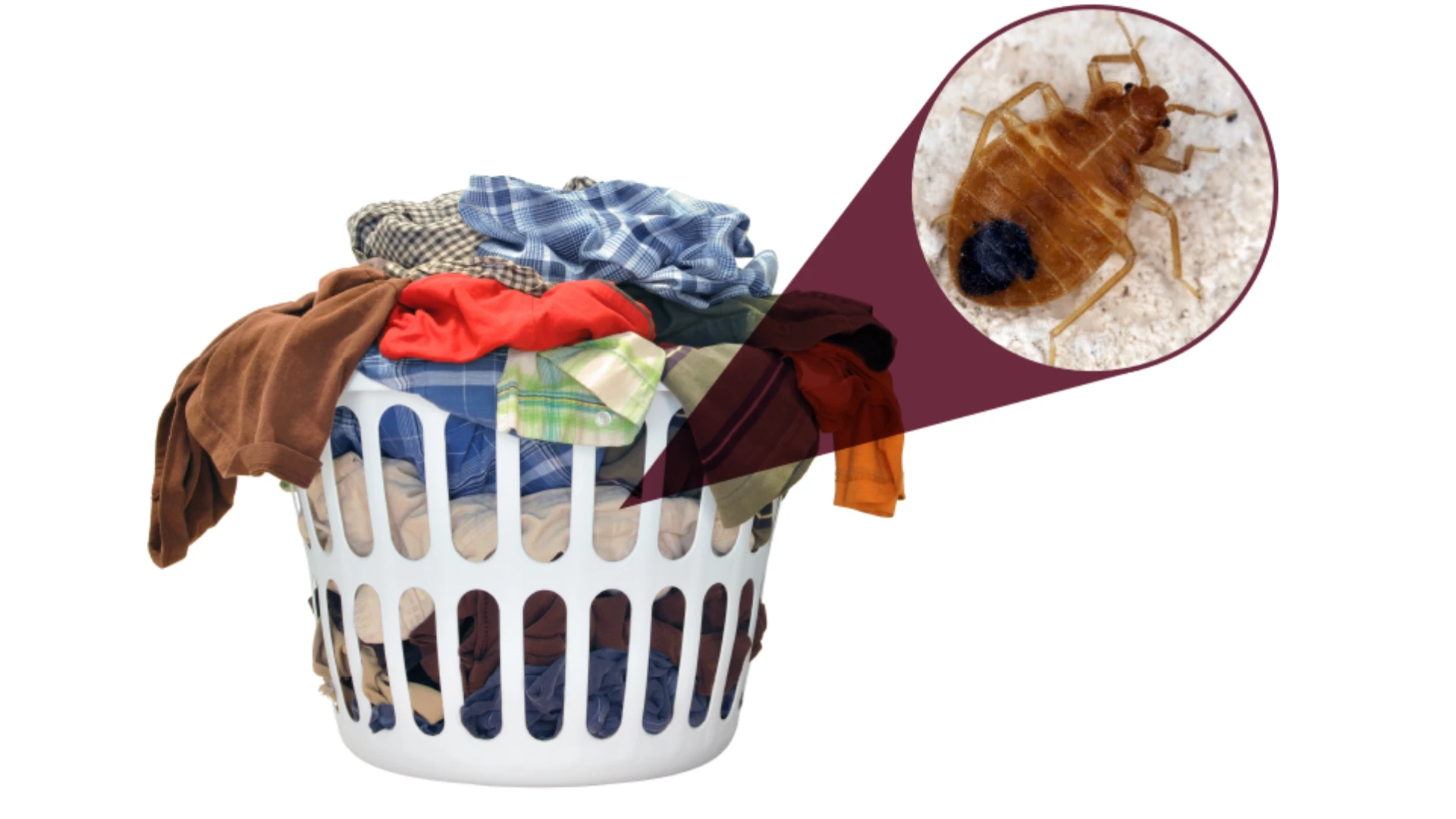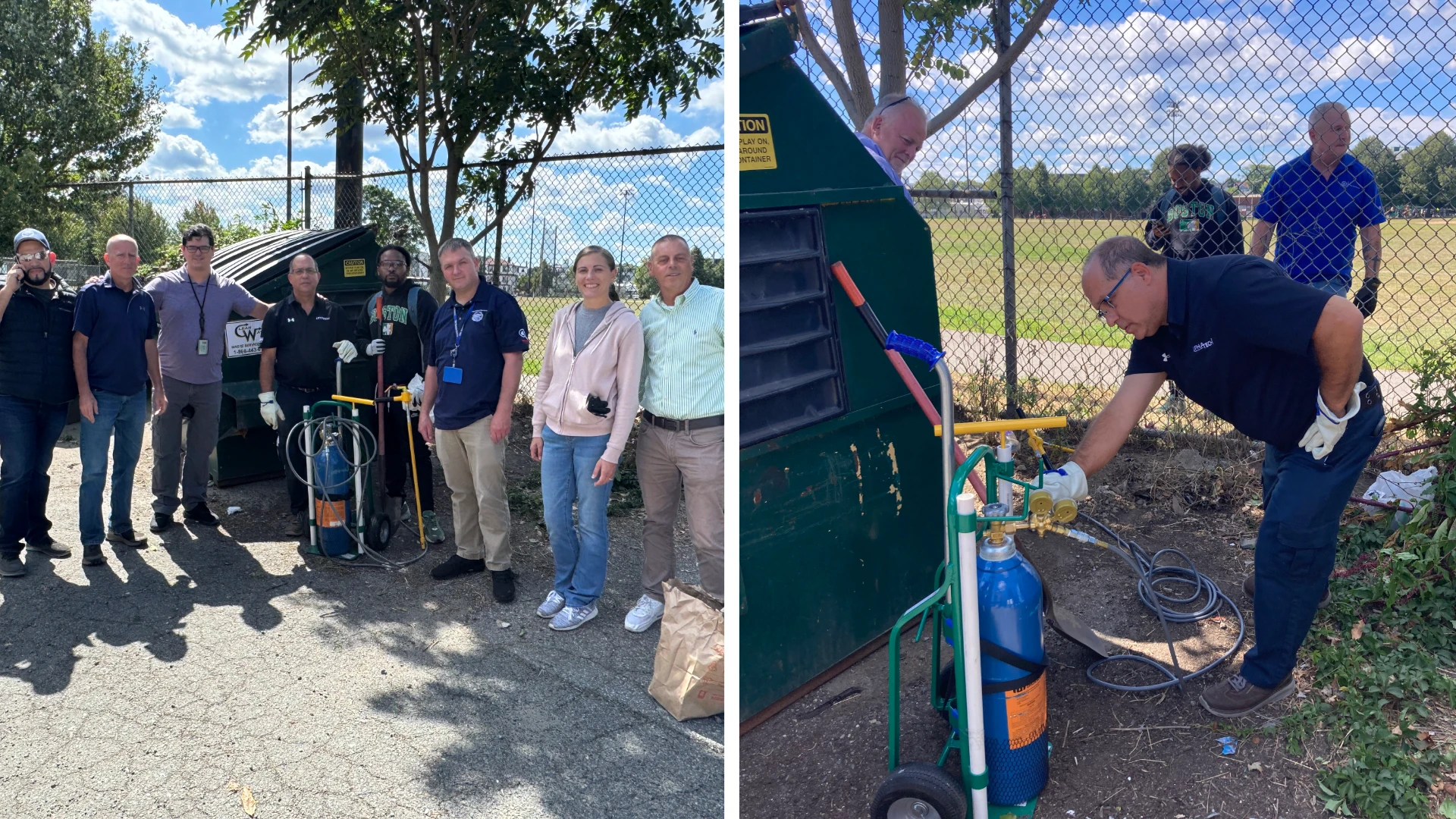 A few years ago while attending NPMA PestWorld in New Orleans, Roger Graham, general manager at Arrow Exterminators, Broken Arrow, Okla., got a call from one of his supervisors while Graham was perusing the exhibition floor.
A few years ago while attending NPMA PestWorld in New Orleans, Roger Graham, general manager at Arrow Exterminators, Broken Arrow, Okla., got a call from one of his supervisors while Graham was perusing the exhibition floor.
“He said, ‘Hey, one of our technicians is supposed to be here, but he’s not answering his phone, and we don’t know what’s going on,’” Graham said. Not far from the US Fleet Tracking booth, and needing to figure out where the MIA technician might be, Graham said he asked an exhibitor if he could pull up his account — Arrow Exterminators uses US Fleet Tracking, a GPS tracking system package that monitors each truck and employee in the firm’s fleet. Indeed, Graham logged into the online system at one of the booth’s computers, called his supervisor and notified him of the employee’s position. Problem resolved.
“It’s pretty neat what it does,” Graham said.
US Fleet Tracking, and other companies marketing and manufacturing GPS tracking products, allow management throughout various industries to track vehicles. With this kind of system, managers can monitor and track their company’s fleet from their computers, tablets and smartphones. For the pest control industry, utilizing such technology can mean easier management of service vehicles, increased efficiency in routing and insurance that technicians are using their vehicles strictly for the job.
Route Efficiency. Sam Sims, director of public relations and marketing, US Fleet Tracking, said the company’s tagline aptly sums up what their products do. “We do tracking for everything that moves,” he said.
For PCOs, this means keeping tabs on service vehicles by means of US Fleet Tracking’s Internet-based interface. As technicians largely work from the road, servicing clients across a certain geographic area, Sims said the company’s product is a good way to boost efficiency — if a new service call comes in, managers can pull up their fleet on a computer, determine which technician is closest to the site, and assign duties accordingly.
“Imagine someone has called you, you have service calls all over the city, and you look at them all over the map,” Sims said. The software can determine how long a service vehicle has been at a nearby site, and thus estimate how long the technician’s job at that site will last, for instance, and a manager can make an assignment that makes the most sense. “The pest control industry is an important industry to what we do,” Sims said, and added that fleet tracking makes sense in small- to mid-sized businesses, a mold into which pest control firms frequently fit.
Graham said he has used several products to manage his fleet, and before he began using fleet tracking software and GPS systems, the process was far more cumbersome. And as Arrow Exterminators covers the majority of northeastern Oklahoma, this was no easy task, either.
“For years, when I would have to re-route accounts, there was no easy way to do it,” Graham said. “There was no software that would do it, so you could either print off logs, sheets and sheets of accounts and try to figure it out, or use grid maps. The easiest thing that I found was making little postcards with every account, then separating them by areas, figuring out how many each tech would be able to handle.”
Graham said that even before his company began using fleet tracking software, he prided himself on helping Arrow become more efficient in terms of routing — but now that each vehicle is equipped with a GPS system, the process is easier to manage. “When I took over this position, routing and scheduling in the service department, just by rearranging the routes I shaved off time,” he said. “People just thought they knew which was the best way (to get to a job).” Many times, they didn’t.
While Graham said implementing the system from US Fleet Tracking was worth his while, it does come with small tradeoffs. “The technology is great as long as someone is looking at it,” he said. A problem Arrow has had, he said, is ensuring that someone is able to take the time to log in and check on things.
Heightened route efficiency can help a pest control firm cut costs, especially considering the high price of gasoline, Graham said. But more than just mapping out quicker routes between jobs, the use of the software alerted Graham to a problem he wouldn’t have known existed otherwise.
“When I started running idle time reports, I was shocked at how often people would just sit around with their truck running for no reason,” he said, noting a feature of the US Fleet Tracking software that can track if a car is on, but not moving.
“I had employees that would have their truck idling 30, 40, 50 minutes, just not going anywhere. One guy debated with me that it doesn’t cost that much more to idle the vehicle versus turning it on and off.” After running comparative reports, Graham said he discovered that such idling time racked up a fuel bill totaling more than $200 more in one month than had the truck been turned off. “That’s just what I saved on fuel just from correcting that one person.”
The Mobile Workforce. Communication with your workforce is key, said Joe Boyle, vice president of customer experience for Fleetmatics, another manufacturer of fleet tracking software and GPS devices. Software like that from his company can be a way to improve these lines of communication, he said.
 “Running a mobile workforce comes with its challenges,” he said. “You don’t always know where they are, and the nature of being out in the field, there’s the reality that you have a substantial amount of assets out there in the field, and they’re expensive.”
“Running a mobile workforce comes with its challenges,” he said. “You don’t always know where they are, and the nature of being out in the field, there’s the reality that you have a substantial amount of assets out there in the field, and they’re expensive.”
As well, Boyle said, most service vehicles act as something of a “mobile bill board” for a pest control company — and managing trucks that have your company’s name and logo to uphold the good reputation of the company is important. “You want to make sure that drivers are doing the speed limits in residential areas, not peeling around a corner,” Boyle said. “It’s really all about visibility and management of that mobile workforce.”
Boyle noted the strong focus on customer service in the pest control industry, and said that Fleetmatics products are a way for PCOs to enhance that customer service. “Your customers have to somewhat act on faith, (your technicians) are coming out and applying a spray, they’re setting traps,” he said. That proof of service can enhance a pest control company’s reputation for customer service, he said.
Jeff Graisser, vice president of operations for Viking Termite and Pest Control, Bridgewater, N.J., said his company uses SageQuest, a tracking brand owned by Fleetmatics. Graisser said the software has allowed him to successfully rebuff some customer complaints that a service technician did not properly do their job at an account.
“We’ve had scenarios where a customer calls us up, and says, ‘This guy was never here,’” Graisser said. “You can go in and do a kind of breadcrumb trail and see where the technician was, and you can say, ‘Hey, he was there, here he was parked right in front of your house, and here’s how long he was there.’”
Arrow’s Graham concurred with the use of defending technician’s work to skeptical customers. “When we first started using (a termite bait system), we had so many complains, ‘Your technician wasn’t here for more than five minutes.’ Once (the customers) understood we were checking to make sure the employees were going the work they were supposed to do, that pretty much stopped the complaints.’”
Managing for Misbehavior. Another advantage for PCOs using fleet tracking products is the ability to know when and if staff members in the field are doing things they aren’t supposed to.
“I think the biggest advantage is saving on labor cost,” Graisser said. “You have a better handle on what the guys are doing. We went through the whole ‘Big Brother’ thing initially, but they follow the rules, they go where they’re supposed to go.”
Graham said his systems were installed to help the company, not because he believed his employees were breaking protocol. “We were honest and up front with everybody, we told them point blank, ‘We’re putting these in, this is why,’” he said. “We’re not looking to catch anybody doing anything, we just want to know what’s going on. Most of them don’t have a problem, and the ones that are worried probably are doing something wrong. And they shouldn’t be doing it on your dime. If there’s an issue it will be dealt with.”
One issue that service company owners must deal with occasionally is staff performing side jobs for cash. US Fleet Tracking’s Sims said that issue can be immediately rectified with tracking products. “That stops instantly,” Sims said. “(A company) might have a crew out that’s treated three or four houses in a neighborhood, but they didn’t realize another three or four houses were treated for cash.” This equates for a loss of products, labor and potential revenue, Sims said.
Fleet tracking systems can set speed limits on vehicles, and Graisser said he has taken advantage of another function where he can set a “geofence” around certain areas. “This would be somewhere you don’t want your vehicles to go,” he said. “For example, I don’t want a guy sleeping in a park for four hours, or you don’t want a guy routinely stopping off somewhere. We have those set up for everybody’s home, so when they do get within 100 feet of their house, an alert will go off to their manager.
“It’s all a matter of managing what these guys are doing out there on the road,” he continued, and added that he feels the SageQuest system has improved productivity since the company began using it. “We’ve done a lot of other things over that period of time as well. This has been a part of it.”
The author is associate editor of PCT magazine. He can be reached at bdelaney@giemedia.com.

Explore the January 2013 Issue
Check out more from this issue and find your next story to read.
Latest from Pest Control Technology
- Rentokil Terminix Expanded in Key Markets with 2024 Acquisitions
- In Memoriam: Joe Cavender
- Certus Acquires Green Wave Pest Solutions
- Liphatech Adds Alex Blahnik to Technical Team
- Do the Right Sting: Stinging Insect Identification, Management, and Safety
- VAGA's 8th Annual Veterans Thanksgiving Appreciation Dinner
- Clark's Blair Smith on the Response to Increased Dengue Fever Cases in Southern California
- WSDA, USDA Announce Eradication of Northern Giant Hornet from U.S.





